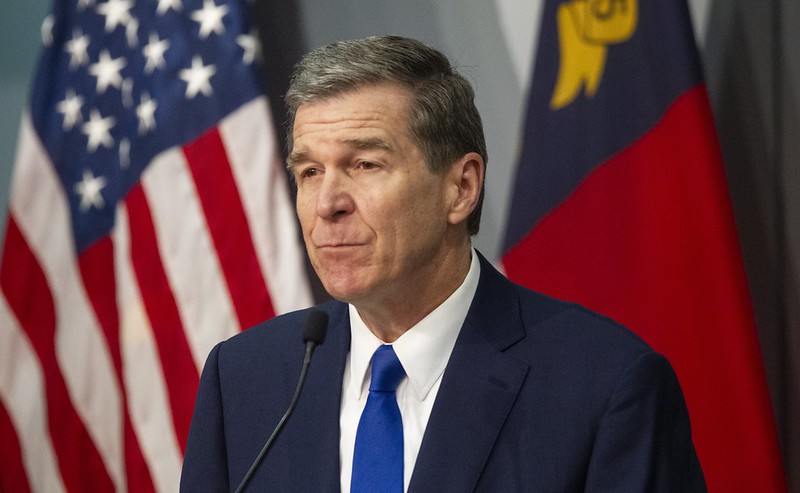
Gov. Roy Cooper signed Tuesday an executive order to prohibit utilities from shutting off services to those who are unable to pay.
“This action,” he explained Tuesday during a media conference, “is particularly important since tomorrow is the first of the month. And I know that that’s the date that many families fear when they can’t make ends meet.”
Supporter Spotlight
The action orders that electric, gas, water and wastewater services cannot be shut off for the next 60 days and telecommunications companies that provide phone, cable and internet services are strongly urged to follow the same rules, Cooper said. This order also encourages banks not to charge customers overdraft fees, late fees and other penalties. The order is in effect for 60 days.
“People should pay their bills and the vast majority want to, and do. But during this crisis, some just don’t have enough money. These protections will help families stay in their homes and keep vital services like electricity, water and communications going as we stay at home,” he said.
Cooper began the conference by reiterating that the stay-at-home order is in effect now. The executive order went into effect at 5 p.m. Monday and is for 30 days until April 29.
“I know it’s hard, but prevention is still the single most important thing you can do right now. Prevention. It means maintaining physical distance from each other, washing hands, coughing into the elbow, those simple things. They’re simple, but they can save lives, including your own,” he said.
Cooper asks residents to be mindful of families who need food and avoid over buying at the grocery store, particularly Wednesday, which April 1, and this week because federal food assistance for families in need comes at the first of the month.
Supporter Spotlight
“The decisions we’re making to battle this invisible enemy have not been easy but they’re necessary to save lives,” he said.
Attorney General Josh Stein said Tuesday during the conference that this past Sunday alone, more than 220,000 North Carolinians filed for unemployment.
“In just the last two weeks, this insidious virus has forced North Carolina businesses to lay off more than 300,000 people,” he said. “These are the people who service at restaurants, they fly us on airplanes and greet us at hotels, they produce and sell our clothing, they manufacture the products and machines we use every day, they do these things and so much more. They are our neighbors and they need our help.”
Stein said that the Tuesday executive order is about taking strong action to provide needed relief to these North Carolinians who are struggling financially through no fault of their own. “This relief isn’t just compassionate and appropriate, it will help protect all North Carolinians. Now is no time for people to be without water to wash their hands or forced into crowded, temporary living quarters.”
Stein added that his office is also “working hard to raise awareness of scams and fraud related to the virus, particularly those using robo calls. Because while the vast majority of folks in North Carolina are rising to the occasion to help others. There are a few heartless criminals trying to exploit people’s fears.”
His office has been gathering complaints about price gouging, and as of Tuesday, 755 have been received and each is being reviewed.
DHHS Secretary Mandy Cohen said that as of Tuesday morning, “we had 1,498 cases in North Carolina, and that’s in 77 counties. The median age of those testing positive for COVID-19 is 47 of all the people testing positive. Currently there are 157 people who are hospitalized and there have been eight deaths.
Across the state, Cohen said, there more than 23,000 tests have been completed. There are 17,000 hospital beds in the state, and 7,000 of those are empty. These numbers are based on about 84% of hospitals reporting and does not include additional surge beds.
“We’re working with our hospitals right now on a plan about what their maximum surge capacity is going to be,” she said.
Director of state Emergency Management Mike Sprayberry said that nearly 1,200 disaster medical volunteers have registered and more than 600 are now approved and at work. These volunteers include retired doctors, nurses and other medical professionals. Volunteers can register online.
As of Tuesday afternoon, Currituck, Perquimans, and Pamlico counties had each reported one confirmed case; Washington and Hertford each have two cases; Pasquotank has reported four; Beaufort County reported five cases; Bertie and Craven counties each reported six cases; Onslow County reported seven cases and one death; Carteret County reported 12 cases; Brunswick County reported 16 cases; and New Hanover County reported 30 cases.
Carteret County reported Monday its first COVID-19-associated death. The patient was a Virginia resident who died on March 28 from complications associated with the virus. The patient was in their 80s and had several underlying medical conditions. The confirmed case and death of this person will be reported in the county in which they resided in Virginia and will not be reflected on the state case count for confirmed cases and deaths in Carteret County.
Dare County announced Tuesday that it had two positive tests but these cases will not show up as Dare County cases with the state DHHS. Although the tests were performed in Dare County, the patients did not provide a Dare County address when being tested.
Brunswick County Emergency Services is welcoming donations of certain types of personal protective equipment for potential distribution to medical providers in the future should the need arise.
To donate unused masks rated N95 or higher, full face shields, impervious gowns, gloves or surgical masks, contact emergency services at 910-253-5383 or leslie.stanley@brunswickcountync.gov from 9 a.m. to 5 p.m. Monday through Friday.







